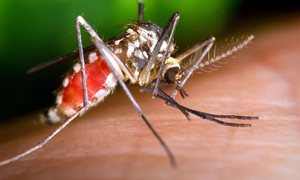
More than a quarter of people with Lyme disease continue to have long-term symptoms that lead to limitations in daily life even after treatment. Symptoms include fatigue, pain and concentration problems. These symptoms can also occur in people without Lyme disease, but less often and less severely than in Lyme patients. This was shown in the large-scale LymeProspect study in the Netherlands, carried out by RIVM National Institute for Public Health and the Environment, Radboud university medical center and Amsterdam University Medical Centre.
Importance of the study
The LymeProspect study shows that some Lyme patients remain limited in their physical and social functioning after treatment with antibiotics. In addition, fatigue, pain and concentration problems are reported more often by people with Lyme disease than by people without this disease: about 27% of the Lyme patients and 21% to 23% of the people without this disease. Also, the complaints of the Lyme patients were more severe. It is likely that such long-term symptoms may be the result of Lyme disease, but only in a small but substantial proportion of patients. It is important to acknowledge persistent symptoms and to obtain a better understanding of the causes of these symptoms. This can help prevent complaints and improve treatment.
Unique research
Principal investigator Kees van den Wijngaard of RIVM National Institute for Public Health and the Environment : "The study ran from 2015 to 2020. To our knowledge, it is the largest study ever of persistent symptoms after treatment for Lyme disease. More than 1,100 adults infected with Lyme disease in the Netherlands were followed for a year to investigate how often and to what extent persistent symptoms occur." The study included examining the quality of life and complaints such as fatigue, pain and concentration problems that arose within six months of treatment and lasted at least six months. People could sign up via www.tekenradar.nl or their general practitioner. In addition, 6,500 people without this disease participated in the study to monitor how often these complaints normally occur. Some of them had reported a tick bite, and others had not.
Lyme disease
Lyme disease is caused by Borrelia bacteria that are transmitted by ticks. Every year about 27.000 people in the Netherlands develop this disease, often in the form of a red ring or rash at the place of the tick bite (an erythema migrans). Most people recover fully after antibiotic treatment, but some continue to have symptoms for a long time. Until now, the frequency of these symptoms has not been thoroughly investigated. Why some people experience persistent symptoms is the subject of continuing research by RIVM, Radboud university medical center and Amsterdam University Medical Centre.
Publication
Prevalence of persistent symptoms after treatment for lyme borreliosis: A prospective observational cohort study - Jeanine Ursinus, Hedwig D. Vrijmoeth, [...] Leo A.B. Joosten, Joppe W. Hovius, Bart Jan Kullberg, Cees C. van den Wijngaard. The Lancet Regional Health. DOI: https://doi.org/10.1016/j.lanepe.2021.100142.
-
Want to know more about these subjects? Click on the buttons below for more news.
More information
Pauline Dekhuijzen

wetenschaps- en persvoorlichter
Related news items
.aspx?width=800&height=533&ext=.jpg&type=BlockColumn1Zoom1)
New test for Lyme disease is not reliable
15 June 2022 To determine whether someone has Lyme disease, doctors in the Netherlands often use antibody tests. For some time now, so-called cellular tests have been available on the market. However, the VICTORY study published in The Lancet Infectious Diseases has found that these tests are not reliable. read more
Field research on malaria vaccine offers unexpected surprise
23 May 2022Field research on the effectiveness of a malaria vaccine, came up with unexpected results for an international group of researchers including Benjamin Mordmüller of Radboudumc. The vaccine evokes a broader response against malaria proteins than there are in the vaccine.
read more
With concerted effort, tuberculosis could be eradicated in 30 years time March 24th was World Tuberculosis Day
24 March 2022 Since 2020, the number of deaths from tuberculosis increased for the first time in a decade, caused by the COVID pandemic: fewer people had access to the right care on time. Some catching up is needed. read more
HIV drug approved for young children Research on optimal dosing published in The Lancet HIV
16 March 2022 For young children with HIV, there is now an effective and safe drug available that inhibits the infection. read more
What does the shingles vaccine teach us about other vaccines? Investigating the role of trained immunity
27 January 2022 The vaccine for shingles, a condition that causes itching, pain, and blisters, is 90% effective, even in elderly. This is remarkable, since most vaccines offer less protection in elderly. Radboudumc is investigating why this vaccine works so well and how it might help us to develop better vaccines. read more
